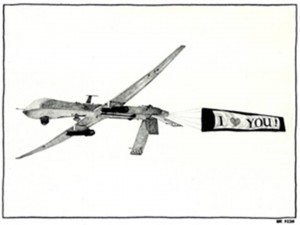
Intelligence Oversight Steps Back from Public Accountability
The move by Congress to renew the FISA Amendments Act for five more years without amendments came as a bitter disappointment to civil libertarians who believe that the Act emphasizes government surveillance authority at the expense of constitutional protections. Amendments that were offered to provide more public information about the impacts of government surveillance on the privacy of American communications were rejected by the Senate on December 27 and 28.
Beyond the specifics of the surveillance law, the congressional action appears to reflect a reorientation of intelligence oversight away from public accountability. The congressional intelligence committees once presented themselves as champions of disclosure. They no longer do so.
The first annual report of the Senate Select Committee on Intelligence, chaired by the late Sen. Daniel K. Inouye, stated in 1977 that “While most of the work of the Committee is, of necessity, conducted in secrecy, we believe that even secret activities must be as accountable to the public as possible.”

Of course, the question of how much accountability is “possible” has always been debatable. But the basic principle of maximum possible disclosure was endorsed by subsequent Committee leaders including Sen. Barry Goldwater and Sen. Daniel P. Moynihan, who also wrote in 1981 that “intelligence activities should be as accountable as possible to the public.” In 1999, Senators Richard Shelby and Bob Kerrey affirmed on behalf of the Intelligence Committee that “as much information as possible about intelligence activities should be made available to the public.”
But in recent years the Committee’s periodic statement of principles has changed in a subtle but significant way. In its most recent report in 2011, the Committee said it seeks “to provide as much information as possible about its intelligence oversight activities to the American public consistent with national security concerns.” Instead of disclosure and public accountability for intelligence activities, the Committee would promise only to reveal as much as possible about its oversight activities.
What makes this rhetorical shift noteworthy is that it seems to correspond in broad strokes to a shift in the character and activity of the Committee away from public accountability for intelligence. Past Committees did not always press for public accountability (and were not often successful when they did), and the current Committee has not been completely indifferent to it, but there does seem to be a perceptible trend.
The Senate Intelligence Committee used to be at the forefront of debates over public disclosure of intelligence. Demands for declassification — often for intelligence budget information — were a normal feature of annual intelligence legislation in the 1990s. Public hearings, including hearings with non-governmental witnesses, were commonplace. To varying degrees, Senators like Daniel Moynihan, Howard Metzenbaum, Arlen Specter, Bob Kerrey, and others were thorns in the side of U.S. intelligence agencies in support of public disclosure.
Over the past decade, however, the Committee’s priorities appear to have changed, to the detriment of public accountability. In fact, despite the Committee’s assurance in its annual reports, public disclosure even of the Committee’s own oversight activities has decreased.
In 2012, the Committee held only one public hearing, despite the prevalence of intelligence-related public controversies. That is the smallest number of public hearings the Committee has held in at least 25 years and possibly ever. A non-governmental witness has not been invited to testify at an open Committee hearing since 2007.

Phi Beta Iota: Congress is morally disengaged and legally irresponsible. The US secret intelligence budget is pure pork — corporate vaporware — and produces “at best” 4% of what a major commander needs. That is not just a failing grade, that is failure on a scale so grand that the attendant corruption must be acknowledged as equally grand. Intelligence with integrity? Not when it comes to intelligence oversight.
DuckDuckGo / drones rendition assassination
Google / drones rendition assassination



